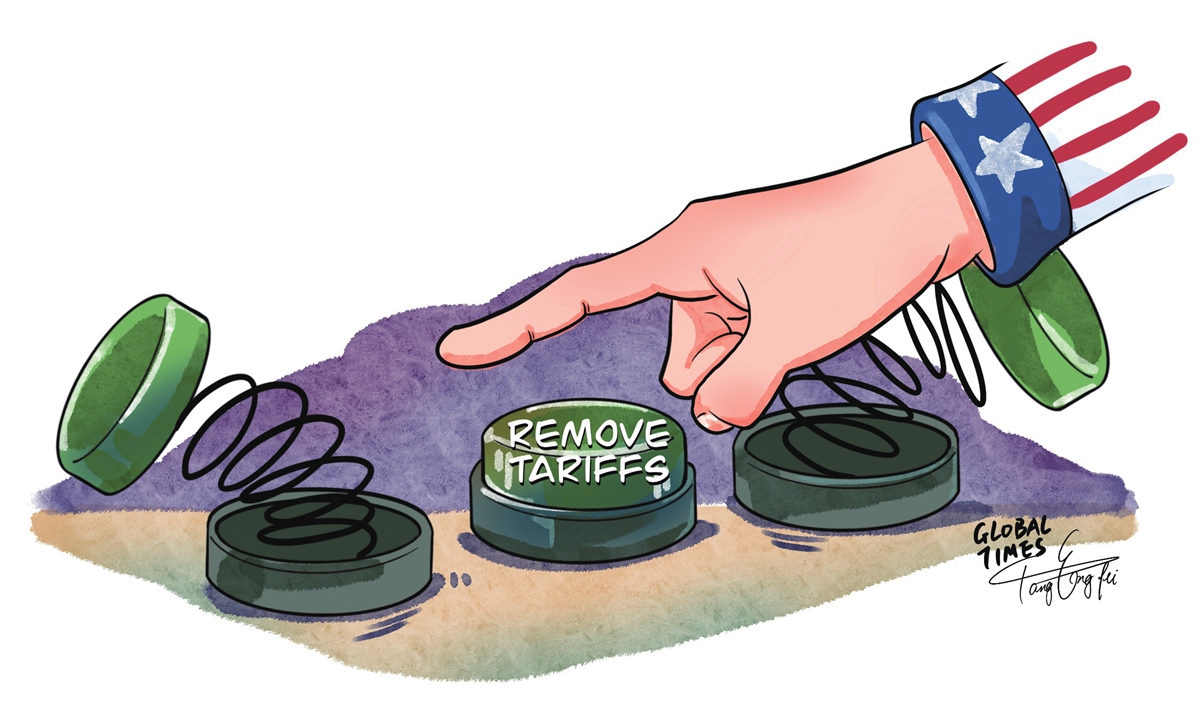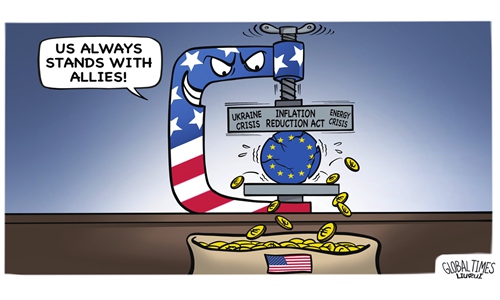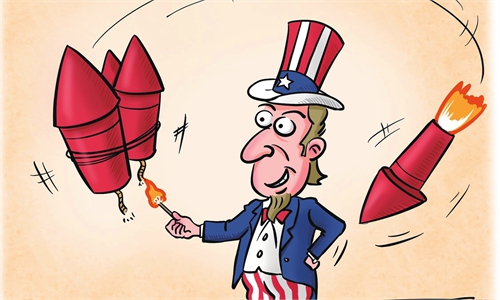
Illustration: Tang Tengfei/GT
On March 22, 2018, former US president Donald Trump initiated the trade war with China by signing a memorandum under the Section 301 to impose unilateral tariffs on Chinese goods.At that time, the move was aimed to reduce trade deficit with China and lift US manufacturing. But five years on, the grave damage inflicted on the US economy, China-US economic ties and global economy has pointed to the opposite. Instead of achieving its intended objectives, the US has become the biggest destroyer, bringing great uncertainties to the global trading system, sabotaging a much-needed driving force for world economic recovery from the COVID-19 pandemic.
As the economic harms grow, businesses are increasingly annoyed and vocal about the Trump-era tariffs on Chinese goods. For instance, American importers said they will continue to appeal the ruling after a panel from the US Court of International Trade has rejected importers' arguments that the Trump-era tariffs were wrongfully imposed, the South China Morning Post reported on Wednesday. Moreover, in February, about 6,000 American importers filed a lawsuit demanding reimbursements for the billions of dollars they have paid in duties. These American companies are not speaking for China, but for their own interests.
Despite the rising discontent from the business community, Washington has not only shown no interest in eliminating the Trump-era tariffs on Chinese goods, but instead ratcheted up pressure on China by promoting "decoupling" and imposing curbs on high-tech exports to China. Yet, wrong actions will only cause more serious consequences. Just take a look at the problems bedeviling the US economy, one would know how costly US' mistakes in China trade policy can be.
To name a few, high tariffs on Chinese goods were part of the reason behind ongoing high inflation in the US, the biggest headache for the Federal Reserve that is facing tough monetary policy choice. Other US economic harms that the trade war has caused include cutting $1.7 trillion from the market value of listed American firms, loss of 250,000 US jobs, and increasing American household spending by $1,300 each year, according to media reports.
Trump may sincerely believe eating some pain in a trade war with China was worth it if it could really reduce bilateral trade and trade deficit. But the problem is that anything that goes against the laws of economic development is simply unsustainable. The most compelling proof of this is that the tariffs on Chinese goods haven't changed the continuous growth in China-US trade over the past five years.
Total merchandise trade between China and the US rose to a record high of $690.6 billion in 2022, exceeding the previous record set in 2018, the latest data from the US Commerce Department showed in February. Also, the US goods-trade deficit with China widened 8 percent year-on-year to $382.9 billion, the biggest on record after the $419.4 billion shortfall in 2018.
The US always claims that it is at a disadvantage and suffers loss in trade with China, ignoring the fact that in the context of globalization era, the nature of bilateral trade is mutual beneficial and win-win, and it is China's supply of low-cost and high-quality goods that has underpinned an era of high consumption and low inflation for American consumers over the past two decades. Now even if the US reduces its imports of some products from China, it still needs to source supplies from other countries. That may explain why US trade deficit was on the rise over the past five years. In 2022, US trade deficit widened to a record $948.1 billion.
Of course, there is no denying that China's businesses involved in trade with the US has been affected by the high tariffs, to a certain extent. If Washington can reflect on the economic consequences of the five years of trade war, that would be great. But China doesn't pin all hopes on a policy change in the US. Over the years, China has been working to overcome the negative impact by expanding and diversifying its trade market with more competitive products. The record high foreign trade volume set in 2023 is a manifestation of such efforts. Meanwhile, China has also stepped up efforts to boost domestic demand.
China has made it clear that China-US trade is not a buffet where the US can pick and choose what it wants. There is no way that the US demands China to help in some areas to relieve pressure on the US economy while still pressuring China in other areas at the same time. Economic and trade cooperation between the two sides must be mutually beneficial, and not just serve the interests of the US alone. If the US wants to seek cooperation, it needs to change its approach toward China, such as lifting tariffs on Chinese goods, sanctions on Chinese companies as well as relaxing curbs on chips and other high-tech exports to China.



